#said-bookisms
Text
How to Write Dialogue
A lot of a story is told through narration: action, description, exposition, and so on. But a big part of characters interacting tends to be speech. In prose, we call this "dialogue."
People communicate in their own way.
To a new customer entering their store, a gruff character might say "What do you want?" Whereas a more personable character might say "Welcome in! Can I help you?"
Maybe the character would use body language, with a wave as they speak. Or only use body language to communicate in this moment, with a polite nod and smile to the customer with no dialogue.
If they share some knowledge with character they are communicating with, they may speak differently, with an unspoken shared context for their conversation. Compared to speaking to a character who doesn't have that knowledge.

If both characters have the shared context of knowing Frank is coming for tea at 6, it would be odd if one said "Frank is coming for tea at 6." Because the person they are speaking to already knows that. (Unless they have some reason to believe they've forgotten.)
But it would be natural for one to say, "When was he coming, again?" or "I hope he doesn't start smoking like he did last time," without even declaring who they're talking about, or what the situation is. Just the new stuff. Just like people do in real life.
To mark text as being spoken instead of narration, it should start and end with double-quotes, "like this." There are novels that use single-quotes, but this is a rare exception and tends to be more common in older books. But if that's your thing, you do you.
If a line of dialogue ends with a complete sentence, it will normally put the punctuation before the last quote. There are exceptions, and stylistic choices, but that's the general rule for dialogue.
"The sky isn't blue."
You can have quotations within the dialogue, marked with single-quotes. And, in theory, the further down the rabbit hole you go, it switches back and forth between single and double quotes.
So, a quote within dialogue has single-quotes. A quote within a quote within dialogue has single quotes again. And so on...
"And he said to me, 'Go over there and tell them, "Frank said, 'The sky is blue, darn it!'"'"
Yes this does look weird, and yes it can be confusing keeping track of the layers of quotation. Which is why it's very rare, in fiction at least. Instead of making a direct quote, a speaker normally paraphrased, or rewritten in other ways to simplify the structure of the dialogue.
"Frank said to tell you the sky is blue."
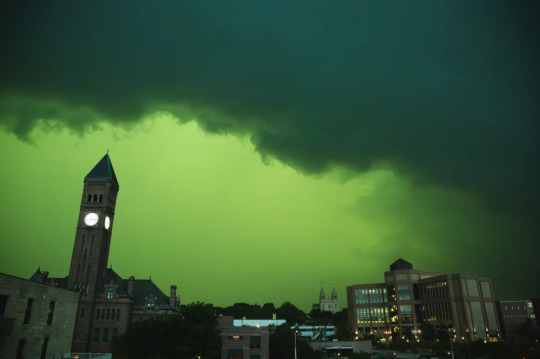
If the dialogue ends its own sentence, but the sentence as a whole continues with a dialogue tag, the full-stop/period at the end of the dialogue becomes a comma.
"The sky isn't blue," Geraldine said.
This is because a dialogue tag is actually part of the same sentence.
A dialogue tag is like a luggage tag tied to the end of the dialogue to tell us more about how it was said.
In the example above, there is a dialogue tag to tell us the character who said it: Geraldine.
You could write the dialogue tag in a couple of other ways:
"The sky isn't blue," said Geraldine.
Geraldine said, "The sky isn't blue."
But this is uncommon in modern novels, and makes it have a different old-timey vibe that may be confusing or distracting for readers. So bear that in mind if you want to try it out.

Now, if it's part of a longer piece of dialogue, you could leave it to the end of the spoken words to have the dialogue tag as normal. But the reader will be wondering through the whole thing... "Yeah, but who's even saying all this?"
To avoid this, try to have the indication of the speaker sooner rather than later. You can use any of the methods from this article to do so. But one example would be:
"Fourscore and seven years ago," Lincoln said, "our fathers brought forth, on this continent, a new nation, conceived in liberty, and dedicated to the proposition that all men are created equal..." (and so on)
For longer text like this, you can actually have paragraphs within the dialogue. The paragraph doesn't end in a quotation mark because the dialogue isn't ending. But then the new paragraph does have a quotation mark to remind the reader it's still dialogue.
"Four score and seven years ago, our fathers brought forth on this continent, a new nation, conceived in Liberty, and dedicated to the proposition that all men are created equal.
"Now we are engaged in a great civil war, testing whether that nation, or any nation so conceived and so dedicated, can long endure."
Again, confusing to read, and rarely needed or used in modern fiction. But something to know about. A better way would be to break up the dialogue with some "Blocking"--a stage term for people moving around the scene.
This would be a new paragraph, as it focuses on something else, and then another new paragraph continuing the dialogue. If we focus on a different character with the in-between paragraph, you might want to remind them who is speaking when they continue.
Lincoln stood for a moment, taking in the crowd. Then drew in a breath. "Four score and seven years ago, our fathers brought forth on this continent, a new nation, conceived in Liberty, and dedicated to the proposition that all men are created equal."
The crowd looked uneasy, a low murmur floating across them.
Lincoln shook his head. "Now we are engaged in a great civil war, testing whether that nation, or any nation so conceived and so dedicated, can long endure."

Going back to dialogue tags... Other verbs can be used instead of "said," to better describe how it was said.
"The sky isn't blue," Geraldine muttered.
There is a general tip that the same word shouldn't be used over and over in quick succession, because it draws attention to itself. But this doesn't apply to all words. Structural words like "a" and "the" shouldn't (and often couldn't) be replaced with a new synonym every time they're used.
This is because they simply fade into the background; the reader knows that they are common words and don't matter to the meaning of the sentence so much. So they just sort of brush over it. "Said" is one such word.
Don't be afraid of "said."
Some writers still try to not use "said" much, and instead use "thesaurus words"--synonyms with the same meaning--throughout their writing. However this actually draws more attention to it that using the simple "said," which people brush over anyway.
Take a look at the following examples:
"The sky isn't blue," Geraldine said.
"The sky isn't blue," Geraldine stated.
"The sky isn't blue," Geraldine explained.
Is "stated" describing how the line was said better than "said"? Not really. And is "explained" adding anything to the story that isn't from the dialogue? Nope.
If there is a line of dialogue, then it was said/stated/explained/said in reply/asked, depending on what was said and the context. We know what was said. So when a character asks something, the verb "asked" doesn't do anything that reading the question didn't do. So you may as well put "said."

"The sky isn't blue," Geraldine smirked.
"The sky isn't blue," Geraldine yawned.
And if you go too far with it, trying to incorporate an action into it, you can get yourself into a real mess. Smirking is not saying anything. You can smirk while saying something. But if the action you are performing is a smirk, or yawn, or laugh... you, my friend, have uttered no words!
These are known as "said-bookisms": words used to avoid writing "said." And named after a book that was written listing such words for writers to use (you may have seen similar posters/graphics on the internet). But as we don't need to avoid writing "said," we can safely throw out the book!
Earlier we used "muttered" instead of "said." Was that okay? Well, did that add to story? Does it tell the reader more about what was said? Yes! Now they know the words weren't simply spoken; they were said quietly, muttered under the breath.
Anything that tells us more about how the dialogue was said is fine. If the character shouted or screamed, or they muttered or mumbled, or slurred... they aren't necessarily obvious from the dialogue. So if they fit, and they describe the utterance of words, then go for it!
Sometimes writers have entire actions as a dialogue tag.
"The sky isn't blue," Geraldine moved over to the window, peering out.
That action isn't describing the act of saying that dialogue. So it doesn't make sense for it to be part of the same sentence. Just split it into its own sentence, and you should be good.
"The sky isn't blue." Geraldine moved over to the window, peering out.

However, these things may be indicated earlier in the paragraph, before the dialogue begins.
Geraldine looked up. "The sky isn't blue."
Because Geraldine has been established as the focus of this paragraph, any dialogue will be assumed to come from Geraldine.
Here, the first sentence describes an action the character took. But it could be a narrated thought. Or an expression. You can indicate the focus of the paragraph in many different ways, but however you do it, that can be used by the reader to infer who the speaker is.
You can of course add a dialogue tag anyway, using the pronoun of the character.
Geraldine looked up. "The sky isn't blue," she said.

The tone of the dialogue--the way it is said by the character--can also be implied by the context in the paragraph up to that point.
Geraldine laughed. "The sky isn't blue."
Geraldine gasped. "The sky isn't blue."
Whatever context the reader has before the dialogue will colour how they "hear" it in their minds as they read.
Geraldine whispered, staring up in awe. "The sky isn't blue."
Geraldine screamed. "The sky isn't blue!"
Geraldine staggered through the door, drunkenly. "The sky isn't blue."
In the last example, the character's general state or attitude is shown. So as you read what she says, you'll naturally imagine it being said differently. That's the beauty of writing...
The final story in the reader's mind is made from the teamwork between writer and reader.
You can actually get away with having no indication of the speaker at all, in particular circumstances.
Geraldine smiled, her nose wrinkling. "The sky isn't blue."
"I think you'll find it is, Gerry dear," Frank muttered, packing.
"No, no, you don't understand... the sky is not blue!"
"Poppycock."
"Look!"
Did you have any trouble knowing who was saying what? If not, why not? Because we had other context clues.

The first couple of lines had the speakers clearly declared. And, as they're the only two characters that are in the scene, it's natural that they'd each take turns--going back and forth in their conversation. Also, if this is in the middle of a book and you're used to how the characters talk differently, that can help too.
Just be careful to not rely on this back-and-forth effect for too long, because it will get confusing after a bit. Just pepper in something to remind the reader of whose turn it is--the character does something as they speak, or a simple dialogue tag is added. And the reader will keep up better.
14 notes
·
View notes
Text
It really irks me when I see that post going around telling people to stop overusing said and use a bunch of what fancy verbs instead. Like noooooo, stop the terrible elementary school writing advice. Said is a mostly invisible word (followed closely by asked and replied), and sometimes all the reader needs to know is who spoke that line of dialogue, the end. Once in a while, it’s useful to switch up to something like whispered or shouted, but it’s easy to overdo that stuff. Most of the time, adding actual description is much better.
This is my writing rant for the day. 😅 I didn’t want to tag the post so I’m just going to glare at it from my own corner of my own blog.
6 notes
·
View notes
Note
👋 fanfic writer ask game: 3, 4, 15?
Yosh o/
3. What’s a fic idea that you have but haven’t written yet?
A couple, but they're both ROTTMNT because everything else is already in the process of being written. One being relatively short and like a palate cleanser for NRFTW I guess (and because Hueso's entire presence in that fic was trying to get Leo to pick up his phone because there are humans in his restaurant whyyy):
Hueso takes his trash out at the end of the night and finds Leo sprawled in his dumpster for unknown reasons, but he's slightly bruised and exceedingly high and this is a very large test of Hueso's patience (and he doesn't feel any concern, of course he doesn't)
Okay, so upgrading Bishop from annoying third-wheel thorn in everyone's side to the outright antagonist as the man tries to adjust his world view after the events of NRFTW and makes a few calls, some of them surprisingly decent but several of them Not Decent At All, on the background of the turtles dealing with weird spots of corruption in mechanical objects found across the city (think Rise comedy crossed with creepy horrorville as a vending machine tries to pack itself with victims off the street, or an ATM literally having an existential crisis, and then there's all those Albearto bears)-- luckily Donnie seems to know where to find all this weird corruption and it reacts to him in a variety of ways from positive to outright yandere. His brothers would really like to know how and why and if he's doing okay? Please? Yes, this is a direct follow on from NRFTW, though several months down the track so Leo can get out of bed already. (The poor guy.)
I did have a third idea but literally 24 hours after I thought of it I saw the plot go past in a summary on AO3 so I went WELP /tosses it out the window, lmao
4. Do you prefer writing multi-chapter or oneshot fanfictions?
Much of a muchness! Like 1. above is a one shot and 2. most definitely isn't, I'm happy to write either depending on the story I try to write. I've written more one shots than multi-lengths, I think, but sometimes you can tell stories in the space of a few pages. (And sometimes you think you can and you're crying 89 pages later going why.)
15. Are there words, phrases, mannerisms or scenes you tend to use a lot?
Oh gosh, yes. People blink and breathe a lot in my fics, lmao. I MEAN WE ALL DO but I use them as shorthand for //processing// a lot, or breathing to steel yourself for what you're about to do next, etc etc. As said much earlier, I have a habit of saying such things like "He slept" but I've been good about this lately! (She says knowing full well she uses it in the chapter she's currently writing, shh.)
I tend to quirk a lot of small grins, have lopsided grins, and You Would Not Believe How Many Characters Are Capable Of Raising A Solitary Eyebrow (Or Eye Ridge As The Case May Be) and I have a fondness for writing scenes where characters wake up after several days out but that's just the comfort side of my hurt/comfort head space. Also I apparently kidnap people a lot ¯\_(ツ)_/¯
ALSO LIKE MANY I SUFFER FROM SAID-BOOKISM (i.e. way too many adverbs, I literally comb through afterward and try to remove some they're just everywhere like my italics) so. I definitely have my tells as an author, but hopefully nobody grinds their teeth over them, lmao.
Thank you!
Fanfic Writer Ask Game Here
11 notes
·
View notes
Text
Thesaurus Wrex
I reblogged this about a week ago, and ever since there’s been a classic example at the back of my mind, rattling around like a roulette ball but never settling into a slot.
Until now - and of course once I remembered it, I also remembered posting about it before, as an example of “even professional writers get details wrong".
TL:DR - when writing, make sure an alternate word from a list means what you want it to mean - because sometimes it might mean something completely different.
*****
This cap is from my Penguin 1953 edition of “Roget’s Thesaurus” which isn’t much different to the 1852 original (there was a major revision in 2000, not before time).
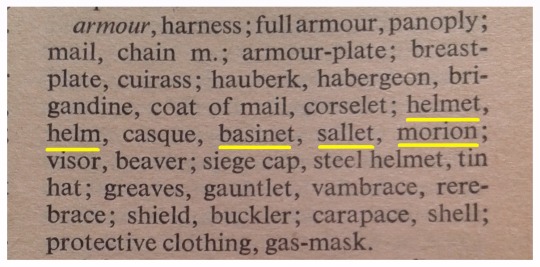
Here’s a cap from @dduane’s “Synonym Finder”, a US book from 1961 whose editors seem very fond of “casque”.

The problem, for people who don’t know, is that while all of those are synonyms for “helmet”, none of the underlined words are synonyms for each other because they each mean a specific kind of helmet, and can’t (or shouldn’t) replace one for the other, any more than entries under “VEHICLE, n. bus, car, lorry, motorcycle, streetcar, tram...” can be interchanged and still make sense.
It looks like fantasy author Robert E. Howard didn’t know those differences.
It seems he used a thesaurus / synonym finder when writing his 1935 Conan novel “The Hour of The Dragon / Conan the Conqueror” with the “said-bookism” intent of not repeating any one word too often.
This is never a good move; replacing a "quiet” word with a “loud” one just draws attention to the word rather than what it’s trying to emphasise.
These examples show how “being clever” can trip up a writer who’s not as clever as they think they are; they deal with armour terminology (my hobby) but apply to every subject from Archaeology to Zoology.
If the details aren’t important, leave them out.
If they’re important, get them right.
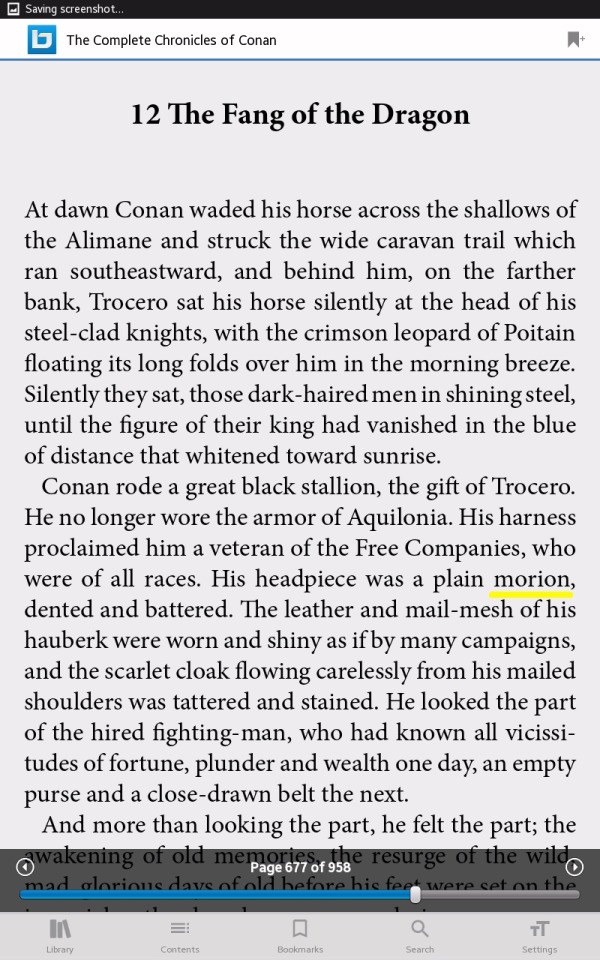
A morion is the kind of helmet usually associated with Spanish Conquistadors and Papal Guards.

(BTW - take note of how a Zweihander sword is carried on parade.)

However, just a few pages later this happens.
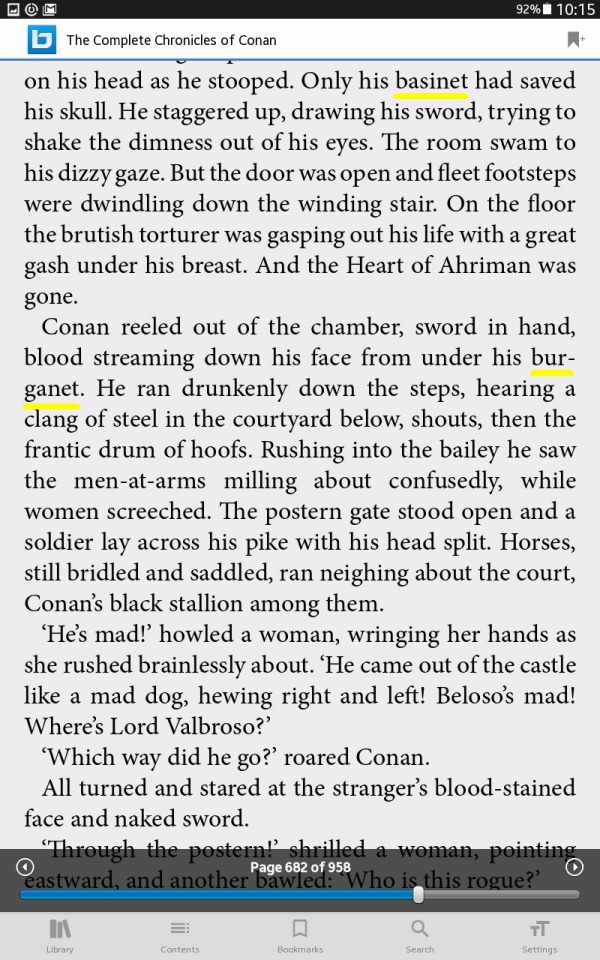
In the first paragraph that Conquistador morion has transformed to a basinet * (sic) from 200 years previously, as worn by Edward the Black Prince...


...while 8 lines later it’s become a burganet * (sic) as worn by Landesknechts and Border Reivers. It’s from the same period as the morion, but it’s definitely not the same helmet.
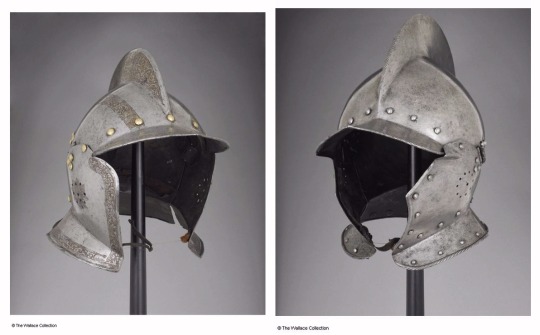
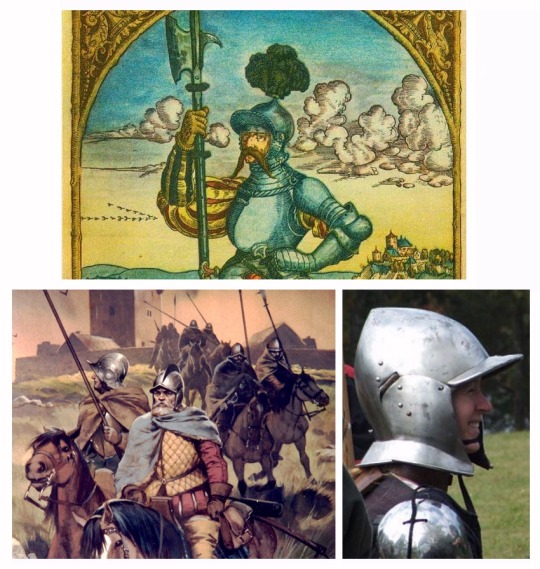
I’ve posted this Writer Advice a few times: if detail doesn’t matter, it’s better to stay vague.
Nothing makes elaborate detail fall flat quite like getting that detail wrong, especially since it’s often the sort of detail meant to Show Your Work to those intended to be impressed by it.
The comment “well who’ll notice?” is best answered with “then why bother?”
If Howard had (1) found out what each of those words meant then (2) picked the one best suited to how he imagined the costumes or even (3) just stuck with “helmet” and reworked a sentence or two so repetition of that word wasn’t a problem, this mistake wouldn’t have happened.
The same goes for any other writer in any other field of fiction.
When using a Thesaurus or Synonym Finder to broaden vocabulary, it’s always worth checking how broad that vocabulary has become, and making sure it hasn’t wandered down some side-road which shows the writer doesn’t know where they are any more.
*****
* NB - for ease of finding them on Google, the preferred spelling is basCinet and burgOnet. Just saying.
71 notes
·
View notes
Text
Over the years I've internalized the idea that "said bookisms" (colorful non-standard dialog tags like "he growled," "she huffed," etc.) should be avoided and that the only dialog tags we use should be "he/she/they said" or occasionally "asked" or "replied."
Like a lot of standard writing advice, this rule is pretty arbitrary. I have yet to hear a compelling argument for why the more colorful dialog tags are bad, except that some people don't like them because they make the prose feel a bit too purple (which is ultimately a subjective judgment).
As with anything, said bookisms can get annoying if they are overused, and there are definitely books where they are overused, but there's also such a thing as going too hard in the other direction.
1 note
·
View note
Text
the phantom tollbooth semi-review
my second grade teacher read her class this book. i adored it. a while back, i bought a copy, intending to reread it, but hadn't gotten around to it... you know how these things are, right? but recently i had cause to sit down and reread it, which i'll describe below.
i was putting together my website, and got it to a point where i was largely happy with it; however, i realized i needed a cover image for the reviews section. i hit upon the idea of making a collage with pages torn out of books. it's an obvious way to go about it, but i had a problem. what book could i bear mulching for such a project? i was considering my (still unread) copy of atlas shrugged, but the print was too small, and i wasn't sure how i felt about memorializing a book i despise like that.
once i remembered my copy of the phantom tollbooth, the solution was obvious. it is such a playful work. it treats words like toys, treats language like a game; it is so obviously didactic and immensely charming despite (or because of) that. it's like if alice in wonderland was a 90s edutainment game. it's a delight.
however, i can't come at this with the simple adoration i felt for it as a child. its writing style is perhaps too heavy on adverbs and said-bookisms. the various encounters and setbacks are generally brief, and while that keeps them from overstaying their welcome, it also results in everything feeling kind of like a theme park ride. i can forgive these minor sins; it's just so earnest that i find it hard not to. it's a bedtime story picaresque.
of course, there's the more pernicious undercurrent. naturally, the fantasy world is monarchical, and the hero's quest is to rescue some princesses. looking past this feels like the price of admission for engaging with 99% of the fantasy genre. there's more to pick at, though. the founding myth of the world it depicts involves a prince conquering a land filled with the demons of ignorance, settling a vile wilderness. this --- of course --- rings alarm bells. to some extent, this can be chalked up to standard usa background radiation. it's an american children's book from the 1960s. of course the Charming Fanciful Backstory is a settler-colonial retread. of course the humbug brags that he had ancestors traveling with columbus.
these flies in the ointment are small in size if not in impact --- the aforementioned Charming Fanciful Backstory is the most egregious one, and it only consists of a couple pages --- but they're there, and it feels wrong not to mention them. still, though, i enjoyed my time with the book.
as i read, i ripped particularly resonant pages out to collage with. this went against everything i've been taught for handling books, but... it feels right. it feels fitting to have one of my first literary loves enshrined in art. a tribute to treating words as toys and language as a game, and a tribute to having a critical eye for everything.
...
it's tempting to say this book gave me a playful relationship with writing that i've carried forward until now.
those sorts of after-the-fact narratives are so often inaccurate... but it's a nice story, isn't it?
0 notes
Text
Please, use said.
You’ll see posts going around with alternatives to said, saying “said is dead!” and people complaining about how they don’t know what to replace said with.
Let me tell you a secret: You don’t have to replace said.
Said is a workhorse, and it’s neutral, and most of the time your readers will barely notice it’s there. All it does is tell you “This piece of dialogue is attributed to that character.” Nothing more, nothing less.
“Boring!” you shout.
No, it’s really not. Most of the time, people just… say things. Listen to conversations. Sometimes people shout or yell or whisper or murmur. Very, very seldom does anyone declaim. Save that one for the town crier in your mediaeval AU, yeah?
Most of the time, people say, with the odd bout of asking or replying where appropriate. And honestly, the vast majority of the time, you can get away with them just saying stuff.
That doesn’t mean that your dialogue has to be an endless stream of he said, she said. If you have two people in a conversation and you are punctuating/paragraphing correctly, you don’t need to tag every line.
“If character one says something,” said Bob.
“And then character two responds,” said Marjorie.
“Then we know this is Bob speaking.”
“And we know this is Marjorie, even if we don’t tag it.”
You can also use actions to indicate who is speaking - though please, pretty please, don’t punctuate actions the same as you punctuate speech tags, otherwise you end up with what look like very bizarre speech tags.
“This is how you do it.” Bob points to the correctly punctuated piece of dialogue and the action that follows it.
“Ahhh, that’s better.” Marjorie smiles in satisfaction.
Thus you know exactly who said what, and not a “said” or a “says” in sight!
So okay, use said most of the time, use actions to indicate the speaker, punctuate and paragraph correctly then trust your reader to follow the conversation. “But I want to use all those pretty speech tags!” I hear you cry.
That’s okay. There’s a place for those speech tags. It just isn’t on every line. If Bob and Marjorie declaim and declare and clarify and insist and postulate all. the. time? Those words lose any flavour or impact they would otherwise have. Your characters come off as rather hysterical, precisely because they never simply say anything, and when you want to have a character yell or whisper or extrapolate, it falls flat, because your characters come off as hyperemotional the whole time. When Bob yells, we don’t get the sense that he’s angry or scared or desperate, because he spends his whole time sounding that way and we’ve come to expect it. When Marjorie whispers, we don’t think she’s sharing a secret or something dangerous or just trying not to be overheard, we think she’s just being typically melodramatic.
It’s the literary equivalent of crying wolf; you’ve made your reader immune to actual extremes of emotion by having the characters seem extreme when they’re just going about their daily lives.
There are times when more usage of extremes is appropriate. If your characters are in a noisy environment, then of course they’re going to raise their voices. If your characters are in bed together, then they’re likely going to lower their voices. But don’t do it unless you have an actual reason, and even in those extreme circumstances, you don’t have to find a dozen synonyms for “shout” - your reader is capable of deducing that if your characters are trying to have a conversation in the middle of a death metal concert, they probably won’t suddenly be dropping their voices just because you didn’t actually spell out that they yelled this piece of dialogue. Trust your readers, don’t treat them like idiots. No one likes being talked down to.
If you want to go off and do some research on the “Said is not dead, please stop saying that” side of things, they’re often called “said bookisms.” But the simple rule here is that most people say stuff most of the time, neutral words aren’t inherently boring, they’re just… neutral… and that you have options to make your dialogue more interesting and diverse besides reaching for your thesaurus. Use other speech tags, sure, but only because there’s actually a good reason. Avoiding the use of “said” is not a good reason.
83 notes
·
View notes
Text
I’m way too old to be just now figuring out how to properly punctuate and arrange dialogue without waving my arms and blindly guessing, and yet here I am...
*grumbles and continues editing*
#not sure if clumsy speaker tags and said-bookisms#or constantly switching Kaidan between Major and Lieutenant#is/are more embarassing#but it's a close tie#*facepalm*#still learning#don't skip English kids#Red Streak
5 notes
·
View notes
Note
7 and 15 for the ask meme!
Also you've already said it for yourself, but I want you to know the shaft scene of Underdark lives in my head rent-free. Everything from the moment the train lights pass overhead to the moment Mikey has to climb back out of the shaft with Leo tied to his back. That's like a chapter and a half, I'm sure 50% sure, but I remember like it's been painted on my memory.
me, the author, typing away: oh god this is so STRESSFUL I wonder what happens next
Glad that's someone else's favourite ♥
7. What’s a trope you love to write?
Too many to count. I know I definitely round back to the same ones a lot, but I think the one I love to write (because now that I think about it I do this a lot lmao) it's
> take hero and handicap in some way (whether literally or he's just out of his depth)
> hero gets underestimated
> hero proceeds to think outside the box and kick your ass with whatever improvised tactic comes to hand
Because I LOVE ME SOME INTELLIGENT CHARACTERS and I do this in just about everything, and it may be a direct response to being tired of watching otherwise competent characters get damselled and lie around helpless when they really shouldn't be. (The flip side is if I actually do damsel someone they are fucked up to a level where they Literally Cannot and they will probably fight all the way down to that level because it's the only way to stop my brain from going "but they could do this and--")
I first did that with Kenshin in Tanabata Jasmine, where the bad guys broke his collarbone and took his sword away and he proceeded to have a fight with first a chair leg and then a bowl of rice, so. Kaoru was thinking outside the box the entire time when she was being a small time hacker sliding her way into one of the Top 5 Scariest Zaibatsu In Existence in Zaibatsu Project. That was fun. The list continues from there. I guarantee you this is coming in No Rest For The Weary. A lot. I like underdog fights and impossible odds with inspired badassery. (I also do this in RP a lot, boy Nami did a lot of improv fighting in Luceti.)
15. Are there words, phrases, mannerisms or scenes you tend to use a lot?
OH I SEE HOW IT IS, MY BETA CALLING ME OUT-- jkjk. Um, yes. Mostly Said-Bookisms, which I keep a tight eye on these days because I want to describe tone for every piece of dialogue someone writes and it's Not Necessary. But I'm fond of people speaking mildly and dryly and I like injecting life into conversations but boy it's sure easy to go Too Far with that, so. I also abuse the em dash like many authors and because my usual MO is to switch between Third Person Limited, the passages often have a lot of disconnected thoughts as they start thinking about something else or something happens, so. There are a lot of paragraphs that end with -- and then they sidetrack.
I bet there are phrases that I use a lot. One is 'white-knuckled' which is unfortunate because I'm currently talking about a bunch of kids with green skin and I already noticed I just absently used that in the very first chapter of NRFTW whoops. Also, hilariously, I'm pretty sure I've used the sentence 'He Slept' on its own a few times lately, irony of that story title. I often finish chapters/sections with a very short tl;dr sentence, lmao.
And scenes-- I try my best not to repeat on these, but apparently Mikey and Leo snoozing in bed together is gonna be a repeat theme. Characters waking up confused b/c of concussions and/or drugs and/or Bits of Black Ice Programs Trapped In Their Heads. Bizarrely, I have also written two boardroom scenes in which the protag has to face a bunch of murderous capitalists and outwit them on a verbal scale. The fact that that one occurred twice was not intentional and is a source of great amusement to me.
Thank you!
Fanfic Writer Ask game here.
4 notes
·
View notes
Text
curses! found an a/b/o long fic with a great premise but every speech-tag is a Said Bookism, every paragraph is the same sentence repeated 4 different ways, and there're 20 lines of inner monologue wedged between every 2 words of dialogue so you can never keep track of who’s saying what in reply to whom 😩
have to come back when the writer's older 😪
3 notes
·
View notes
Text
said-bookisms my detested
1 note
·
View note
Note
Hello, this might seem like an odd or unrelated question but, in these uncertain times, do you have any tips for new writers of aspiring historians? I've been feeling awfully discoursged with my writing and the fact that I missed a whole semester of school over the virus.
Let me divide my advice into that for students and for writers.
First, writers, the advice I have now is the same as at any other juncture. Write. Even if you don’t feel like it. Don’t worry if it’s any good. Just write.
One of the earliest lessons I was taught by successful writers, and have only had confirmed in the years since (including by my own experience) is, “Write every day. Even if it’s just 2 pages. Write everyday.” (Or almost every day.)
Writing, like exercise, is a habit. At first, most of what you write on demand may be utter shite. But the more you practice, the better you’ll get at turning out moderately readable prose on demand. There will be times you’re more inspired, or less, but practice really does improve skill.
Find a writing group. Listen to their critique. Don’t get defensive. Unless you’re spectacularly talented, you probably are that bad. LOL. (I was.) There are tricks to good prose. Learn them. Read your stuff out loud, to hear how it falls on the ear. Read A LOT. I mean A LOT. Good stuff. Study what they’re doing. My teachers were Iris Murduch, Toni Morrison, Graham Greene, John Irving, Flannery O’Connor…. Find a writer whose work picks you up and throws you down again, a little bit broken and a little bit more whole. Figure out how she or he did that.
But don’t neglect the nuts-and-bolts, stuff like, “Passive voice is a Bad Thing,” “Said-bookisms suck,” “Don’t over-choreograph,” and “Just use the character’s name, not eleventy-two synonyms.” And especially “’Emerald orbs’ should never be used to describe someone’s eyes,” or the offending writer should be taken out and shot. ;)

I’m not a big fan of books on the writing craft, but I do recommend Dwight V. Swain’s Tricks and Techniques of the Selling Writer, rev. ed. Some of it is quite dated, but most of it isn’t. Scene and Sequel is still A Thing. It works.
Not everyone can be Carson McCullers to pen classics at 22/23/24 (The Heart is a Lonely Hunter, Reflections in a Golden Eye). But she really only wrote about 4 major novels (in part due to very poor health).
There are writers out there who can count published novels in double-digits. What’s the difference? They sit down and write. It’s not always a classic. In fact, it’s rarely a classic. But it can still be a perfectly good yarn that takes someone out of herself for a little while.
Long ago, I met author Lawrence Dorr, and when introduced, rather shyly said, “I’m not a real writer, but I want to be someday.” Meaning I wasn’t published yet. (I was about 19 at the time.) Dorr just looked at me and asked, “Do you write?” “Yes.” “Then you’re a writer. A writer writes. A writer can’t not write.”
As you can see, I never forgot that exchange.
Dorr was positive inspiration. Harry Crews was negative. That SOB would make me so mad, I once chucked a typewriter out the sliding glass door of a second-story apartment. Broke the door and typewriter both, and I had to pay the apartment complex for it. The upside was I bought an Atari with a word processor. And I got better. Unfortunately it was usually after Crews had posted our grades. But I did learn a few things from the misogynistic bastard–including the trick that there is no muse and writer’s block is just an excuse. “Write, godfuckingdammit,” he’d say. “Two pages a day. Write two fucking pages a day.” (He was my professor before he sobered up so he was still a roaring pain the arse.)
He also insisted that when we want to tie up things neatly, throw a monkey-wrench in it. And to write our demons. Nobody wants to read a story in which nobody bleeds (even if figuratively).
I realize all that probably gives away my age, Ha. My first attempt at a novel was written in longhand, then the second was typed on this sucker, and yes I still have it (typewriter, not the novel, thank god; it was terrible):
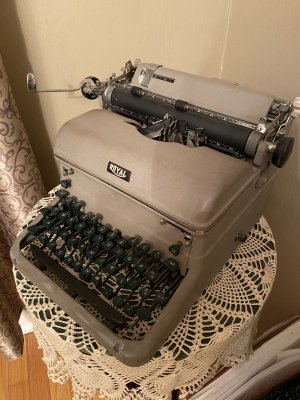
Second, students, I am so sorry that you’ve got to worry about losing your job, and maybe your place to live and your car, and still be expected to do homework and attend lectures online that’s only half an education, if that Will we still be doing this come fall? I don’t know. I hope not, but I fear Covid19 will come roaring back, like the Spanish Flu.
But the world is also a lot different place with much greater understandings of viruses, which is why historians (unlike political scientists and sociologists) rarely try prognostication. History never repeats, even if it sometimes rhymes. If there is any good news in looking back at the Spanish Flu, it’s that after the second wave hit, the US (at least) recovered relatively quickly, especially compared to the ‘29 stock market crash a decade later that set off the Great Depression. The good news out of the Depression was FDR’s ability to shove through the New Deal, which resulted in social safety nets like social security, unemployment benefits, the FDIC, and prepaid hospital insurance (the precursor to the eventual Medicare/Medicaid of the ‘60s).
The unhappy news is that US has a bad habit of not fixing its problems till things break spectacularly…like the Civil War (and the trashfire that Reconstruction became), or the Great Depression, or the violence of the Civil Rights Movement.
Also, don’t forget–historians need records. So write what you see around you. What’s it like to be living right now, at this juncture in history? What does it feel like to be young and looking out at a world on fire?
There you combine both writing with history. Maybe you’ll write your own The Heart is a Lonely Hunter.
17 notes
·
View notes
Quote
James Blish told me I had the worst case of "said bookism" (that is, using every word except said to indicate dialogue). He told me to limit the verbs to said, replied, asked, and answered and only when absolutely necessary.
Anne McCaffrey
1 note
·
View note
Text
I have a new bad writing peeve:
“Nope,” [character] said, popping the “p.”
has joined burly detective syndrome, said-bookisms, and inappropriate changes of verb tense as something that will make me hit the back button immediately, no matter how much I was enjoying the fic up to that point.
2 notes
·
View notes
Note
Grey and Clear?
I’m all fired up about grammar and writing technicalities ingeneral tonight! Apologies for the intensity of my reply!
Grey: What’s a common writing tip that you almost alwaysfollow?
Common writing tips I adhere with near-fanatic fervor toinclude:
Don’t overuse said-bookisms (dialogue tags that are not the common “said” or “asked”)
I almost never use dialogue tags, period, because they add effectivelynothing to a story unless they’re being used to break up a single line ofdialogue for dramatic effect. Action tags are where it’s at, baby.
Don’t overuse epithets
I can’t stand it when characters’ titles or descriptors are usedin narrative just because the author is trying to avoid using either thecharacter’s name or pronoun. No! Just use! Their name! Or their pronoun! “Theman” “the blond” “the villain” “the astronaut” N O use their NAME.Ugh. Quickest way to make me furious, I swear.
Don’t overuse -ly adverbs
I used to be incredible at not using them—I have anentire story some 1.3k long in which not a single -ly adverb appears. Yes, itwas a conscious decision, but prior to editing the story, I only had perhapstwo or three that I had to cut, so not using them at all was just a method ofwriting for me back then. I remember being super aware of them even when I waspreforming sentences prior to writing them down, which is a skill I seem tohave lost. I should try to regain it, honestly—adverbs are stupid easy to useas a crutch, and I know I’m back to relying on them more than I should.
Clear: Do your characters control where the story goes,or do you maintain control?
As a general rule, it tends to be a bit of a give-and-takesituation. If I know where the story is going and how I want to end it, I’mmore open to characters doing some exploring on the way because I already havea goal and I know things aren’t going to completely derail. If I don’t knowwhere things are going, useless meandering tends to happen, which I find frustrating.I don’t like totally feeling my way through a story toward some nebulous, maybe-doesn’t-even-existending, and if I know the ending ahead of time, I have more freedom to let thecharacters explore things within those boundaries… safely, as it were.
ask me color-themed writing questions!
1 note
·
View note